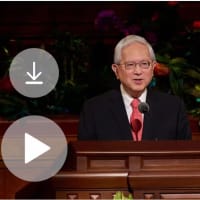「 Soon thereafter, Joseph said that “[a pillar of] light rested upon me [and] I saw two Personages, whose brightness and glory defy all description, standing above me in the air. One of them spake unto me, calling me by name and said, pointing to the other—[Joseph,] This is My Beloved Son. Hear Him!” 」
Shall We Not Go On in So Great a Cause?
By President M. Russell Ballard
Acting President of the Quorum of the Twelve Apostles
April 2020 general conference of The Church of Jesus Christ of Latter-day Saints
(
defy
- 1 …を(平然と)無視する,物ともしない;…に(公然と)反抗する
- defy the Government's policies
- 政府の政策に真正面から反抗する
- 2 〈物が〉〈解決・理解・実現を〉拒む,許さない(◆受身形・命令文不可)
- 3 〈人に〉(不可能と思われることをしてみろと)いどむ,迫る≪to do≫;((古))…に戦い[競争]をいどむ
- 語源
- [原義は「信じなくなる」]
de·fy  (dĭ-fī) (dĭ-fī)
tr.v. de·fied, de·fy·ing, de·fies
1.
a. To oppose or resist with boldness and assurance: defied the blockade by sailing straight through it.
b. To refuse to submit to or cooperate with: defied the court order by leaving the country.
2. To be beyond the application or scope of; be contrary or resistant to: an act that defies explanation; a problem that defies any conventional approach.
3. To challenge or dare (someone) to do something: She defied her accusers to prove their charges.
Synonyms: defy, brave, dare, face
These verbs mean to confront boldly and courageously: a writer who defied the wrath of the authorities; a composer braving all criticism; explorers who dared the unknown; sailors who faced the dangers of the storm squarely.
|
The American Heritage® Dictionary of the English Language, Fifth Edition copyright ©2020 by Houghton Mifflin Harcourt Publishing Company. All rights reserved.
※defyは、現状から勇気をもって出る感じでしょうか。
次に、接頭語de-を、見てみます.
|
de-
pref.
1. Do or make the opposite of; reverse: decriminalize.
2. Remove or remove from: delouse; deoxygenate.
3. Out of: deplane; defenestration.
4. Reduce; degrade: declass.
5. Derived from: deverbative.
[Middle English de-, from Old French de- (from Latin dē-, from, off, apart, away, down, out, completely, from dē; see de- in the Appendix of Indo-European roots) or from Old French des-, out, off, apart, away, completely (from Latin dis-, dis-, and Latin dē-).]
|
de=out=出る すべての表現から出る→→→表現を超える
ついでに、derive を見てみます。
derive
- 1 他〔受身形で〕…を(起源・根源などから)得る;自(…に)由来する≪from≫(◆日常的には be derived [derive] from より come from)
- 2 他((形式))…を(原因・理由などから)得る;自(…に)原因がある,(…から)生じる≪from≫
- accidents that derive from errors
- ミスにより生じる事故
- 3 他〈結論を〉(前提などから)導き出す,推論[演繹えき]する;《化学》〈化学物質を〉(…から)誘導する;《数学》〈関数などを〉微分によって導く≪from≫
- 語源
- [原義は「川から流れ出る」]
文字通り 出ると解釈= 日本語の音と同質 =発音diráiv
※ 語源の探求は、聖書の記述から関心を持っています。
創世記
第11章
11:1全地は同じ発音、同じ言葉であった。 11:2時に人々は東に移り、シナルの地に平野を得て、そこに住んだ。 11:3彼らは互に言った、「さあ、れんがを造って、よく焼こう」。こうして彼らは石の代りに、れんがを得、しっくいの代りに、アスファルトを得た。 11:4彼らはまた言った、「さあ、町と塔とを建てて、その頂を天に届かせよう。そしてわれわれは名を上げて、全地のおもてに散るのを免れよう」。 11:5時に主は下って、人の子たちの建てる町と塔とを見て、 11:6言われた、「民は一つで、みな同じ言葉である。彼らはすでにこの事をしはじめた。彼らがしようとする事は、もはや何事もとどめ得ないであろう。 11:7さあ、われわれは下って行って、そこで彼らの言葉を乱し、互に言葉が通じないようにしよう」。 11:8こうして主が彼らをそこから全地のおもてに散らされたので、彼らは町を建てるのをやめた。 11:9これによってその町の名はバベルと呼ばれた。主がそこで全地の言葉を乱されたからである。主はそこから彼らを全地のおもてに散らされた。
※現在言葉が乱されていて、通じなくても、同じ言葉であった痕跡が、あるのではないかと思っています。
簡単に思いつくのが、例えば、buy =買う。






















※コメント投稿者のブログIDはブログ作成者のみに通知されます